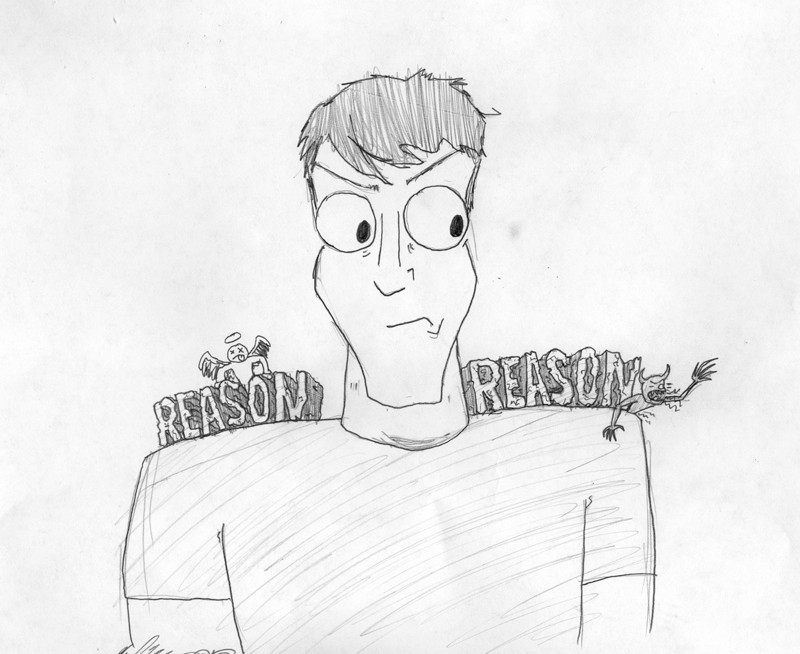Religion no basis for morality
‘Cherry-picking’ religious sentiment does not overcome fear and hatefulness
It has been said that while morality is doing what is right no matter what you are told, religion is doing what you are told no matter what is right.
The moral compass provided by religious doctrine is often cited as one of the reasons why religion is perceived as necessary by its followers. Unfortunately for religious devotees, adhering to a doctrine based not on science and rationality but on fear and superstition is the antithesis of true morality.
For example, the Catholic Church has long been a vocal opponent of contraception due to its belief that family planning flouts the will of God. In March 2009, Pope Benedict XVI stated that the HIV/AIDS pandemic in Africa, where one in five people are Catholic and 22 million people are infected with HIV, “can’t be resolved with the distribution of condoms; on the contrary, there is the risk of increasing the problem.”
In reality, however, proper condom usage decreases the risk of HIV/AIDS transmission by 85 per cent according to a 2000 study by the United States National Institute of Health.
If Benedict XVI were truly concerned with the well-being of humanity, he would consult the scientific research that has proven beyond doubt that condoms help to stop the spread of sexual infections and diseases.
Instead, he and his loyal followers choose to believe the opposite and propagandize their blatant lies, presumably for fear of incurring the wrath of a god who apparently values obedience above social consciousness. Given that 2.1 million people, including 330,000 children, died of AIDS in 2007, the Catholic Church is a dangerous and immoral institution.
A second example is the irrational fear of homosexuality exhibited by the world’s leading religions.
“ Unfortunately for religious devotees, adhering to a doctrine based not on science and rationality but on fear and superstition is the antithesis of true morality
Apparently, homosexual activity is deemed an abomination by God, yet this seems like an extremely petty thing for God to be concerned about, considering it is easily determinable using rational thought that people of the same gender having sex with each other poses no significant threat to human welfare.
Are they causing anyone physical pain? Are they depriving anyone of their basic rights? Are they lying, stealing or cheating? No, no and no. Homosexuality should be of no concern to anyone.
Given that the horrors of war and poverty run so rampant on this planet, one would think that if the devoutly religious were truly motivated by morality and a desire to help their fellow human being they would be channeling their energy toward attacking systems and policies that are genuinely harmful, instead of attacking homosexuals.
Of course, there are countless followers of major religions who are not homophobic and do not oppose the use of condoms yet still choose to identify as members of institutions that officially hold these backward beliefs.
These so-called moderate or liberal followers often cherry-pick the passages in their preferred holy texts that happen to support the values they already hold while ignoring the passages with which they disagree.
It is clear that religion is not their source of morality, for they possess the ability to determine what is or isn’t acceptable to them regardless of religious teachings.
It is therefore questionable why moderate believers feel the need to adhere to religion at all when they are clearly capable of making moral judgments without it.
If scientific research demonstrates that condoms help to stop the spread of HIV/AIDS, it is therefore immoral to oppose the use of condoms because to do so is to desire that suffering and death be inflicted upon one’s fellow human beings.
This is a straightforward concept, yet millions of religious people would rather cower before archaic institutions and obey superstitious dogmas that directly contradict reality.
Religion is not an adequate moral compass because it dictates that things are good or bad simply because God supposedly said so, even if the will of God is harmful and hateful.
If this is the most sophisticated moral guidance that religion has to offer, humanity would surely be the better if religion ceased to exist altogether.
Katerina Tefft is a second-year politics student at the University of Winnipeg and a member of the University of Winnipeg Atheist Students Association.
Published in Volume 65, Number 9 of The Uniter (October 28, 2010)







